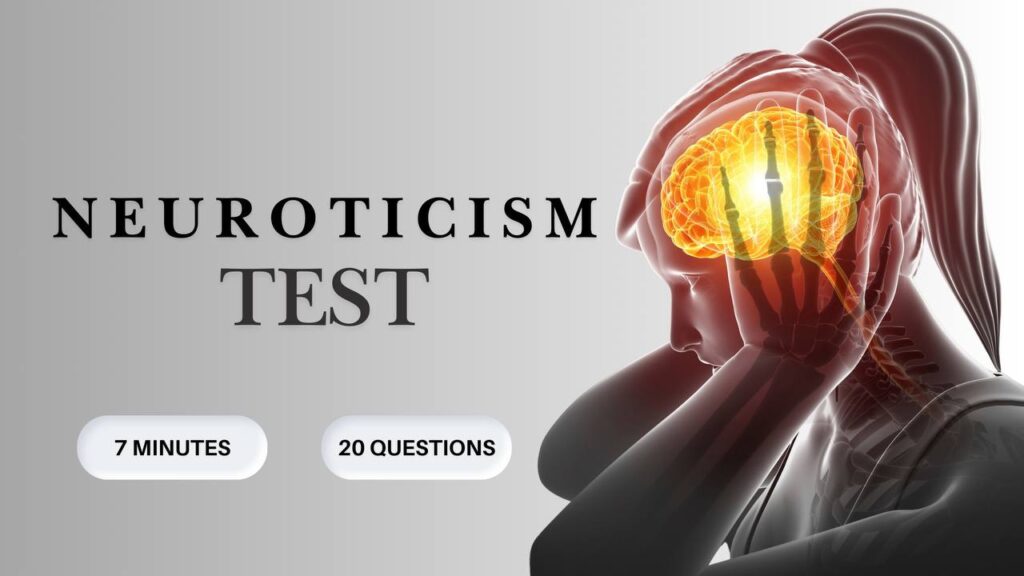
Results
Highly Neurotic
- What This Means: Your responses suggest a high level of neurotic tendencies, meaning you may frequently experience negative emotions or stress.
- Insights:
- May struggle with anxiety, mood swings, or overthinking.
- Likely to feel overwhelmed in challenging or uncertain situations.
- Sensitive to criticism and easily affected by external events.
- Next Steps:
- Explore mindfulness practices, such as meditation or deep breathing, to manage stress.
- Seek support from friends, family, or professionals to navigate challenging emotions.
- Focus on building self-compassion and reframing negative thoughts into constructive ones.
Moderately Neurotic
- What This Means: Your responses indicate moderate tendencies toward neuroticism, with occasional challenges managing stress and emotions.
- Insights:
- Experience emotional highs and lows but can often regain balance.
- Likely to feel stressed in certain situations but recover with coping mechanisms.
- Sensitive to external factors but capable of maintaining resilience.
- Next Steps:
- Identify specific triggers for stress and develop strategies to manage them effectively.
- Incorporate regular self-care activities into your routine, such as exercise or hobbies.
- Practice gratitude journaling to focus on positive aspects of your life.
Emotionally Balanced
- What This Means: Your responses suggest a balance between emotional stability and occasional neurotic tendencies.
- Insights:
- Generally calm and composed, but may experience stress in specific situations.
- Capable of managing emotions without becoming overwhelmed.
- Flexible and adaptable, showing resilience in the face of challenges.
- Next Steps:
- Continue maintaining balance by recognizing and addressing stress early.
- Build on your emotional resilience by exploring practices like mindfulness or cognitive-behavioral techniques.
- Stay attuned to your emotional needs and make adjustments when necessary.
Moderately Emotionally Stable
- What This Means: Your responses suggest a tendency toward emotional stability, with minimal experiences of stress or negative emotions.
- Insights:
- Generally level-headed and composed in most situations.
- Handle criticism and challenges with grace and patience.
- Less likely to overthink or dwell on negative experiences.
- Next Steps:
- Use your stability to support others who may struggle with emotional challenges.
- Continue cultivating resilience by setting healthy boundaries and prioritizing self-care.
- Reflect on areas where you can further enhance your personal growth.
Highly Emotionally Stable
- What This Means: Your responses indicate a high level of emotional stability, suggesting you rarely experience stress or negative emotions.
- Insights:
- Calm and composed even in challenging situations.
- Highly resilient and able to maintain perspective under pressure.
- Rarely affected by criticism or external stressors.
- Next Steps:
- Leverage your emotional stability to mentor or guide others facing challenges.
- Explore new opportunities or take calculated risks, as your stability provides a solid foundation.
- Reflect on how your strengths can contribute to both personal and professional success.
#1. I get stressed out easily.
#2. It takes a lot for me to feel embarrassed.
#3. I have frequent mood swings.
#4. I’m known as someone who is stable during a crisis.
#5. I feel calm and upbeat most of the time.
#6. I’m easily startled.
#7. It’s easy for other people to get me riled up.
#8. My worries feel all-consuming.
#9. There aren’t many things that I’m afraid of.
#10. Once I get anxious or sad, it’s hard to snap myself out of it.
#11. I feel blue frequently.
#12. I spend a lot of time thinking about how things might go wrong.
#13. I don’t get upset about small things.
#14. I criticize myself harshly when I make a mistake, even a small one.
#15. I feel irritable often.
#16. I often doubt my own ability to navigate challenges.
#17. I don’t feel threatened easily.
#18. I tend to make mountains out of molehills.
#19. Encountering a serious obstacle often makes me want to give up altogether.
#20. I can generally keep my emotions under control.
Previous
Finish


